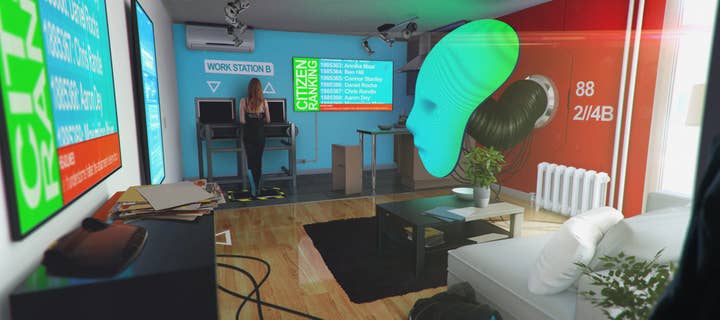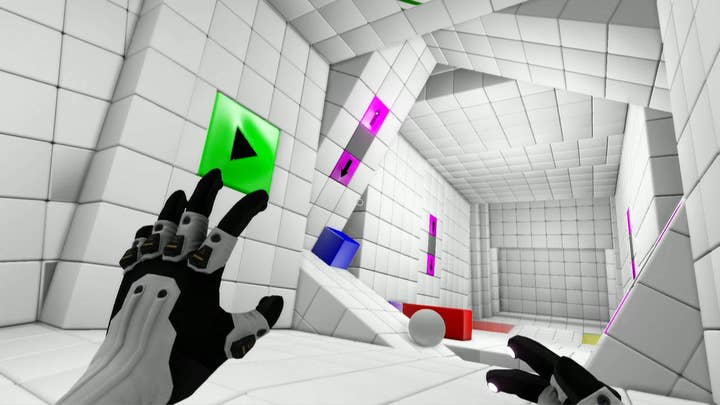Hue, Ether One creators form new studio and indie services firm Advect Productions
“We want to provide services we needed when we first started out, things that a lot of developers don't think about”
Benni Hill and Dan Da Rocha, the creative minds behind several acclaimed indie hits, have launched an interesting new venture.
GamesIndustry.biz can reveal the duo is heading up Advect Productions, a start-up that doubles as both a development studio and a consultancy and services firm that targets indie games makers.
Between them, Hill and Da Rocha have worked on the Qube series of first-person puzzle games, which has 350,000 users on Steam, as well as VR adventure Ether One and last year's colour-themed platformer Hue.

Advect is already working on two new IP as part of Humble Bundle's Humble Originals programme - Thorn and Crescent Bay - which will be unveiled later this year. More importantly, it is reaching out to other independent developers to get the services side of the business up and running.
The range of production services the new studio will provide includes project management, pitch preparation and creative design consultation - offerings built to help fellow developers secure funding, increase their chances of earning publishing deals and ensuring they're working as efficiently as possible to get their own projects ready for release.
Advect will officially announce itself early next week and will be heading to Develop:Brighton to tell the industry more. It has already assisted two projects: Lost Words by Fourth State Games, and QUBE 2 by the duo's previous studio Toxic Games.

Speaking to GamesIndustry.biz earlier this year, when the project was still under wraps, Hill says Advect grew out of a desire to help the other independent developers both its founders would meet and save them from the struggles that they themselves endured on earlier projects.
"We're branching out to not just be in development but to also provide services that we feel we needed when we first started out," he told us. "Things that a lot of independent developers don't necessarily think about but are incredibly important when it comes to funding, publishing and the wider games industry."
He continued: "We meet developers all the time, when we're on the road showcasing our games, and one of the things we heard a lot was people saying they could do with help on certain things. It's not an incredibly large amount of work for us to do as a team. Producing usually is a little bit larger, but most of it is paperwork, continuous project management and so on. It allows us to scale and expand the kind of teams we want to work with."
"[Pitching and product management] aren't things you think of when making a game - but they're the bread and butter of this industry "
The services Advect provides are ones Hill and Da Rocha believe are absolutely vital to not only releasing games successfully, but releasing them in the first place. A great game design is wasted if the developer is unsure about networking and establishing connections with publishers or investors. Even if they're experts at pitching, they might not be managing their project as efficiently as possible - something that will be a hindrance when presenting to investors who expect a firm schedule and realistic budget.
"These things aren't taught in games design courses," said Hill. "They're not things you naturally think of when making a game because you're focused on the creative side of things - but they're the bread and butter of this industry and they're very important things to focus on, as well as general ideas of schedules, your approach to development and the things you're expected to deliver at certain times. That's something we can help with and get straightened out right at the beginning of a project or as it's going into full production."

It's not an entirely selfless strategy. The revenue generated by these services will directly fund Advect's own projects, removing one of the most challenging parts of independent development: securing funding.
"Providing services essentially creates a prototype fund... Even if you sell a game that does well, it often still isn't enough money to fund a whole new game"
"This an area of monetisation that means that we can create prototypes with our own money rather than having to pitch for it all the time," said Hill. "Providing services essentially creates a prototype fund.
"We've been making games for a long time, we've made some successful games, but once you've released one, you're living by the skin of your teeth until you have the funding for the next one - and that depends on how well that previous game does. Even if you sell a game that does well commercially and critically, it often still isn't enough money to fund a whole new game.
"We also have a desire to pay our staff a good salary for their job, not an independent's salary, which is what happens an awful lot in this industry. It's about creating a better future for independent development, and this is how we thought about tackling it: partnering with other developers, helping them develop their games to gain payment really helps us create even more experimental independent titles."
In terms of pricing, Advect aren't giving out full details yet but one would hope the firm isn't going to be charging extortionate amounts. After all, their services are primarily designed for new and inexperienced developers - will they take this into account when dealing with presumably penniless indies?

"It depends on what service they require, but we're very flexible with funding methods," Hill assured us. "Generally if they don't have a huge amount of finances, we look at very small revenue shares - small enough that they're not going to notice a massive difference. For pitch preparation, if they get funding then we'll take a cut of that funding, and we can upscale that if necessary depending on what their needs are. We are also in talks with people that have funding but need project managers.
"[This issue] isn't that these developers are penniless, they just want to focus on the creative aspects rather than doing the business management stuff - and that's something we have lots of experience and success with."
The creative side is something both Hill and Da Rocha are keen to keep focusing on. As mentioned, the consultancy side of Advect has been built to enable development, not replace it - no matter how much demand for their expertise grows.
"There will always be a balance between the two," Hill said. "It's something we're really keen on. It's not charitable, because obviously we need to recoup costs for the time we put into something - but we're passionate about really helping independent developers.
"There's really nothing worse from our perspective than seeing an awesome game that isn't getting off the ground. You can have the best game in the world, but a bad production schedule can destroy it. We want more independent games to be sustainable, to get off the ground and not scrimp by. Even though we're going to be developing our own games, it's something we're always going to be looking out for and trying to do."








